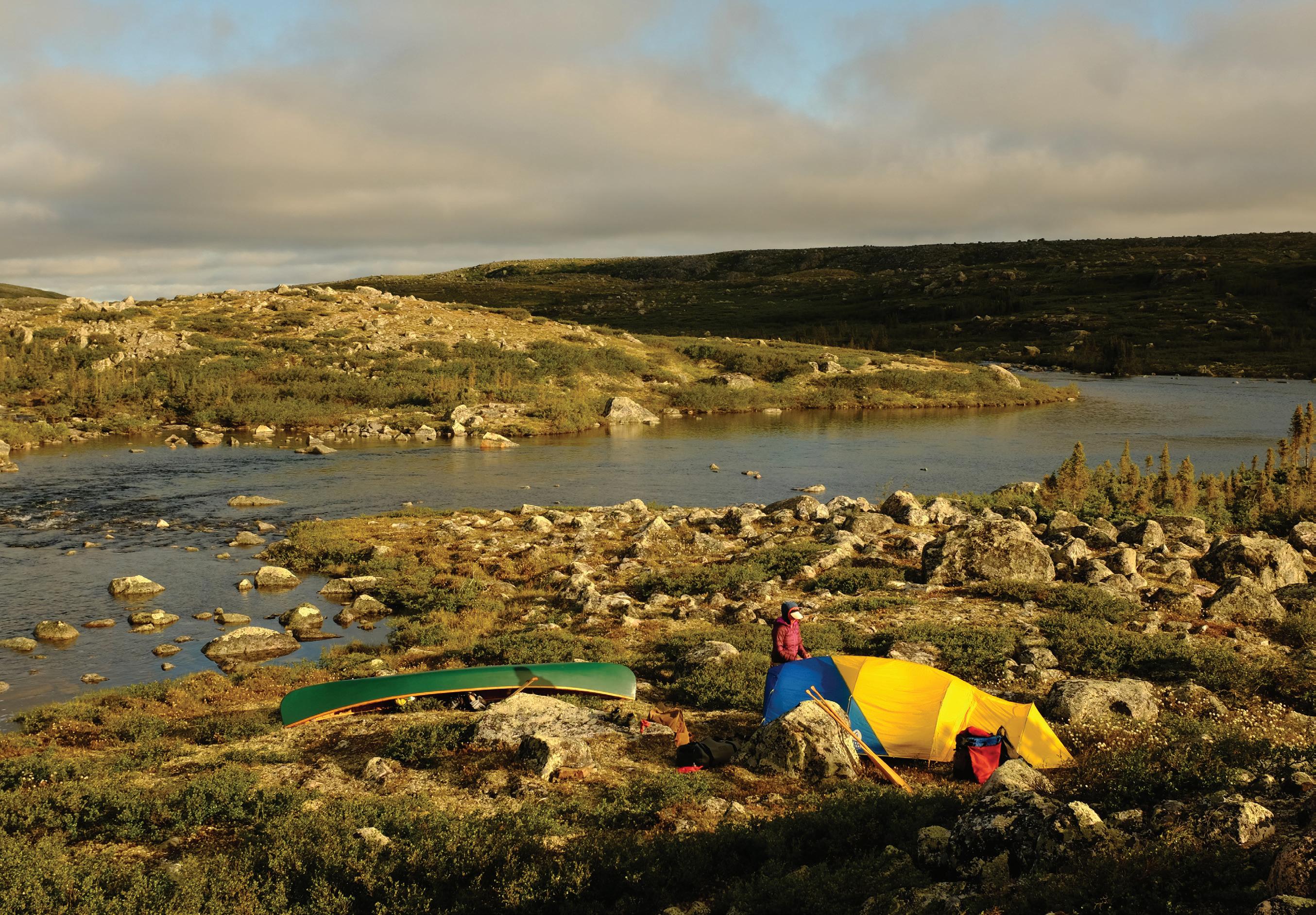
4 minute read
BEING PRESENT IN A LARGE LAND
The late Canadian environmental philosopher and writer John Livingston reminded us that human survival in the natural world depends on a variety of “prostheses.” Hunkered down in subarctic Quebec on the third day of an August gale, I’m thinking about how a mountaineering tent, warm clothes and down sleeping bags are all that’s keeping my partner and me somewhat comfortable. We’ve scrounged all the twigs of firewood the barrens will provide; tonight we’ll burn fossil fuel on a camp stove to cook a meal we dehydrated months ago at home. Meanwhile, the tent strains in the gusts, pulling against guy lines secured to our 85-pound canoe on the windward side.
Despite all the food and hardware we’ve packed to persist for an eight-week journey in this harsh and wild place, waiting is our only choice. We memorize the maps and inventory our remaining provisions. Then we daydream of a faraway world: The projects we’ll tackle, people we’ll see and books we’ll read back home—if the wind ever subsides. It’s frustrating and humbling to be confined to life in the present tense. Yet months from now, I know I will yearn to be the hapless “rogue primate” Livingston described.
BY CONOR MIHELL

As I’ve become more adept at long-distance wilderness travel—and more addicted to its rewards—I have attempted to reduce the prosthetic margins between myself and the natural world. Perhaps this is a new definition of the term “minimalist.” There’s an aesthetic to paddling a wood-canvas canoe in rock-studded whitewater that I found hard to explain until midway through a month-long trip on northern Ontario’s Albany River. I was drawn to my beautiful Prospector canoe for its elegance and beauty, crafted by artisans on a century-old building form. Its high-volume, seaworthy hull speaks to its capacity for expeditions in all types of water; yet its fabric shell and cedar frame demand careful handling.
We had already carefully negotiated dozens of rock-studded rapids without a scratch when a simple misstep on a portage sent the canoe tumbling. My spirits were crushed when I saw a sharp aspen sapling poking through torn canvas and splintered planking. The panic subsided when I realized I could make a repair: A little glue and a scrap of cotton and the canoe was nearly as good as new. With senses heightened to all that can go wrong, we’re even more satisfied when it doesn’t.
On a long trip, the weight and utility of every item must be carefully considered. Oldfashioned fire eliminates the bulk of carrying a stove and gallons of fuel. Fire has taught me to see the forest differently, constantly looking for hard, barkless standing deadwood that makes the best natural fuel. There’s a moment of communion before I harvest firewood, when I consider how the view will change when I remove a tree. I get satisfaction feeling my body warm up as I cut and split. The simple, primeval acts of fire make me feel more connected to nature: I love the warm glow of flames on my skin and the smell of smoke on my clothes, just as I’m thrilled by the discovery of a stash of dry driftwood.
This journey started more than 50 days ago on Hudson Bay. We canoed north along a desolate coastline of sand beaches and polished rock headlands that reminded me of my home on Lake Superior’s north shore. Then we portaged inland, our packs carefully arranged to be shuttled over countless ancient, forgotten trails in three herculean loads. It was rewarding to paddle upstream, moving against the flow of the landscape, getting deeper by the day into Quebec’s Ungava Peninsula.

In time, the wizened spruce of the boreal taiga blended into the treeless tundra and the trip seemed to be getting easier. We made two trips instead of three on each portage. Routines were comfortable and familiar, our bodies strong and sinewy and patterned by steady days on the water and trail. Then, relentless winds stopped our progress dead.
We immediately felt exposed and frazzled. We hid the tent in hollows and tucked behind monoliths. When that failed, we tied off to the canoe, hoping the wind wouldn’t send it sailing. Life was elemental and stressful, but we learned over time to be less agitated by the howling gusts and constant sound of flapping nylon. We put away our watches and travelled when we could: A handful of miles, eked out at dawn, felt like a gift.
On the second-last day of the trip my partner and I sensed a break in the wind. We exchanged few words, silently aware it was time to drop our shelter. I’ve never felt so purposeful in my actions, so present in my relationship with my companion and the natural world. The wind became calm as we paddled into the night. We spoke at intervals about what it felt like to be so close to our journey’s end. We had discovered there’s no prosthetic for patience.
Conor Mihell lives and writes on the eastern shore of Lake Superior and journeys in large, wild lands as often as possible. For more than a decade, he has served as a guide for students in Northland College’s Superior Connections program. Read more in his book The Greatest Lake: Stories from Lake Superior’s North Shore and follow him at conormihell.com



